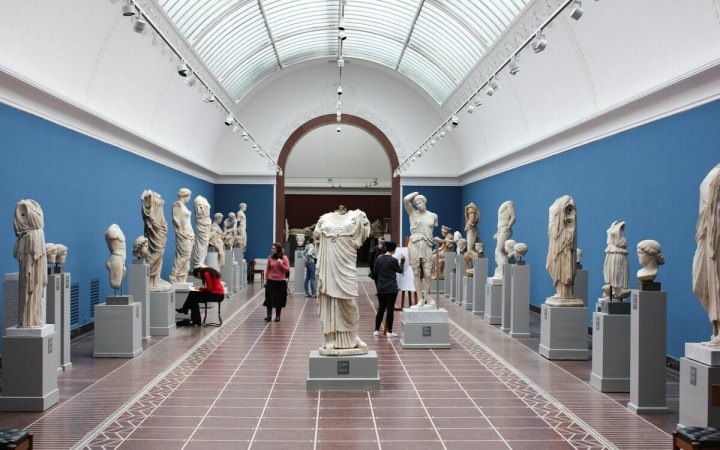By Decree No. 580 dated 3 August 2025, President of Ukraine Volodymyr Zelenskyy enacted the National Security and Defence Council’s decision to impose personal sanctions on 15 citizens of the Russian Federation — senior officials of leading Russian museum institutions actively involved in implementing anti-Ukrainian policies in the museum sector. This information is published on the Ministry of Culture’s website.
The initiative was prepared by the Ministry of Culture and Strategic Communications of Ukraine in cooperation with the Ukrainian National Committee of the International Council of Museums (ICOM) and the public organisation ‘Council of Economic Security of Ukraine’.
On 15 July 2025, the Government of Ukraine approved draft Resolution No. 714-'r' of the Cabinet of Ministers ‘On proposals for applying personal, special economic and other restrictive measures (sanctions).’
Sanctions were applied to the leadership of several Russian museums, including the State Borodino Military-Historical Museum-Reserve, the Russian Ethnographic Museum, the State Museum-Reserve Peterhof, the Pushkin State Museum of Fine Arts, the museum-reserves Kulikovo Field, Sviyazhsk Island Town and Tarkhany, as well as the Andrei Rublev Central Museum of Ancient Russian Culture and Art, the Orenburg Regional Museum of Fine Arts, the Chuvash National Museum, the Leo Tolstoy estate museum Yasnaya Polyana, among others. Some individuals are also members of the governing bodies of the Union of Museums of Russia, the ICOM Russia presidium, and public structures that promote the advancement of Russia’s occupation cultural policy.
Sanctions target those who:
- Organise the illegal registration of Ukrainian cultural assets in the Russian state museum fund catalogue;
- Have personally visited temporarily occupied Ukrainian territories since February 2022;
- Participate in activities aimed at legitimising the occupation regime, including projects of Russian indoctrination targeting children and youth;
- Publicly promote narratives that justify or deny Russia’s armed aggression against Ukraine.
"Russian museums are actively involved in the unprecedented theft of Ukrainian cultural heritage in occupied territories. This is not only about the physical removal or registration of museum valuables but also about attempting to completely erase Ukrainian cultural identity. We are actively working to hold the aggressor state accountable," stated Tetyana Berezhna, Acting Minister of Culture and Strategic Communications of Ukraine.
Since 2014, the Russian Federation has consistently pursued an occupation policy regarding the use of the museum sector, particularly in the Autonomous Republic of Crimea, the city of Sevastopol, and the temporarily occupied territories of Donetsk and Luhansk Regions. Cultural institutions have been used to normalise occupation, spread disinformation, and propaganda.
According to the Ukrainian National Committee of ICOM, as of March 2025, information about 39 Ukrainian museums located in territories temporarily occupied since 2022 has been recorded in the open Russian state museum fund catalogue. By comparison, in August 2024, there were only six such museums. This indicates an intensifying policy of cultural appropriation.
These actions constitute a direct violation of the Hague Convention for the Protection of Cultural Property in the Event of Armed Conflict (1954). Instead of safeguarding cultural heritage in occupied territories, the Russian Federation officially appropriates museum collections and institutions for propaganda purposes.
The sanctions also aim to prevent certain Russian representatives from being elected to the governing bodies of the International Council of Museums (ICOM). Notably, Artyom Silkin and Galina Alekseyeva, who are included on the sanctions list, are candidates for the ICOM General Assembly to be held in November 2025 in Dubai.
The next step will be to promote similar sanctions at the European Union level. Even restrictive measures applied to individuals can set an important precedent, calling into question the future participation of representatives of the aggressor state involved in cultural looting in international processes — including events and elections to the governing bodies of reputable cultural institutions.
In this context, Ukraine’s clear position on protecting the museum sector is especially important. Combating its militarisation, use for propaganda purposes, and illegal handling of cultural property is one of the key tools for strengthening national security and building broad international solidarity in the long term.










